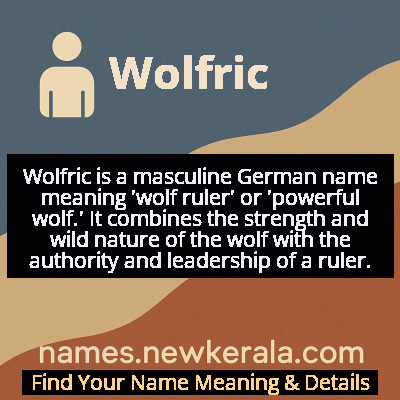Wolfric Name Meaning & Details
Origin, Popularity, Numerology Analysis & Name Meaning of Wolfric
Discover the origin, meaning, and cultural significance of the name WOLFRIC. Delve into its historical roots and explore the lasting impact it has had on communities and traditions.
Name
Wolfric
Gender
Male
Origin
German
Lucky Number
5
Meaning of the Name - Wolfric
Wolfric is a masculine German name meaning 'wolf ruler' or 'powerful wolf.' It combines the strength and wild nature of the wolf with the authority and leadership of a ruler.
Wolfric - Complete Numerology Analysis
Your Numerology Number
Based on Pythagorean Numerology System
Ruling Planet
Mercury
Positive Nature
Adventurous, dynamic, curious, and social.
Negative Traits
Restless, impatient, inconsistent, prone to indulgence.
Lucky Colours
Green, white.
Lucky Days
Wednesday.
Lucky Stones
Emerald.
Harmony Numbers
1, 3, 9.
Best Suited Professions
Sales, marketing, travel, entertainment.
What People Like About You
Versatility, charisma, adventurous spirit.
Famous People Named Wolfric
Wolfric of Haselbury
Christian hermit and saint
English hermit known for miracles and spiritual guidance, venerated as a saint in local traditions
Wolfric the Black
Norse warrior
Legendary Viking chieftain mentioned in Norse sagas for his ferocity in battle
Wolfric von Eschenbach
German knight and poet
Minor noble and poet in the tradition of German Minnesang, contemporary of Wolfram von Eschenbach
Name Variations & International Equivalents
Click on blue names to explore their detailed meanings. Gray names with will be available soon.
Cultural & Historical Significance
The name reflects the warrior ethos central to early Germanic culture, where animal symbolism was deeply embedded in personal identity and social hierarchy. In Norse mythology, wolves held sacred status, with Fenrir representing destructive power and Geri and Freki serving as Odin's companions. This mythological context gave wolf-names additional layers of meaning, connecting bearers to both earthly power and divine favor. Though never extremely common, its persistence through centuries demonstrates the enduring appeal of wolf symbolism in European naming traditions and the continuous fascination with names that convey strength and leadership.
Extended Personality Analysis
Individuals named Wolfric are typically perceived as possessing strong leadership qualities combined with protective instincts. They often demonstrate the wolf's symbolic traits: loyalty to their 'pack' (family and close friends), strategic thinking, and resilience in challenging situations. Like the wolf that hunts in coordinated packs, Wolfrics tend to be team-oriented but with natural authority that others respect. They often exhibit a balance between solitary independence and strong social bonds, capable of both individual initiative and collaborative effort.
The name suggests someone who is fiercely protective of those they care about, with an intuitive understanding of social dynamics and hierarchy. While potentially intense or serious in demeanor, they typically possess deep emotional intelligence and form lasting, meaningful relationships. Their strength often lies in patience and timing - knowing when to act and when to observe, much like the wolf stalking its prey. This combination of strategic thinking and loyal protection makes them natural leaders who inspire confidence and trust in others, while their connection to the wolf's wild nature gives them an edge of unpredictability and raw power that commands respect.
Modern Usage & Popularity
In contemporary times, Wolfric remains a rare but distinctive choice, primarily used by parents seeking strong, historical names with Germanic roots. It has seen a slight resurgence in popularity due to the trend toward vintage and powerful-sounding names, particularly in countries with strong interest in medieval history or Norse/Germanic heritage. The name is most commonly found in Germany, Scandinavian countries, and among communities with interest in historical reenactment or medieval studies. While not appearing on mainstream popularity charts, it has gained some traction in fantasy literature and gaming communities, where its evocative, strong-sounding quality fits well with heroic character archetypes. Modern usage often shortens to 'Wolf' or 'Ric' for everyday convenience, maintaining the name's strong character while adapting to contemporary naming practices. Its rarity makes it an appealing choice for parents seeking unique yet historically grounded names with masculine strength and character.
Symbolic & Spiritual Meanings
Symbolically, Wolfric represents the fusion of wild nature and civilized leadership. The wolf component symbolizes intuition, freedom, and connection to primal instincts, while the ruler element represents structure, authority, and social organization. This creates a powerful metaphor for balanced leadership - someone who understands both the wild, untamed aspects of human nature and the need for order and governance. The name suggests a bridge between the natural world and human society, embodying the ideal of a leader who remains connected to fundamental truths while guiding others. In psychological terms, it represents the integration of shadow aspects (the wolf) with conscious authority (the ruler), making it symbolic of wholeness and self-mastery. The combination also hints at protective strength - like an alpha wolf defending its pack - making it emblematic of guardianship and loyal leadership that balances fierce independence with deep community commitment.

